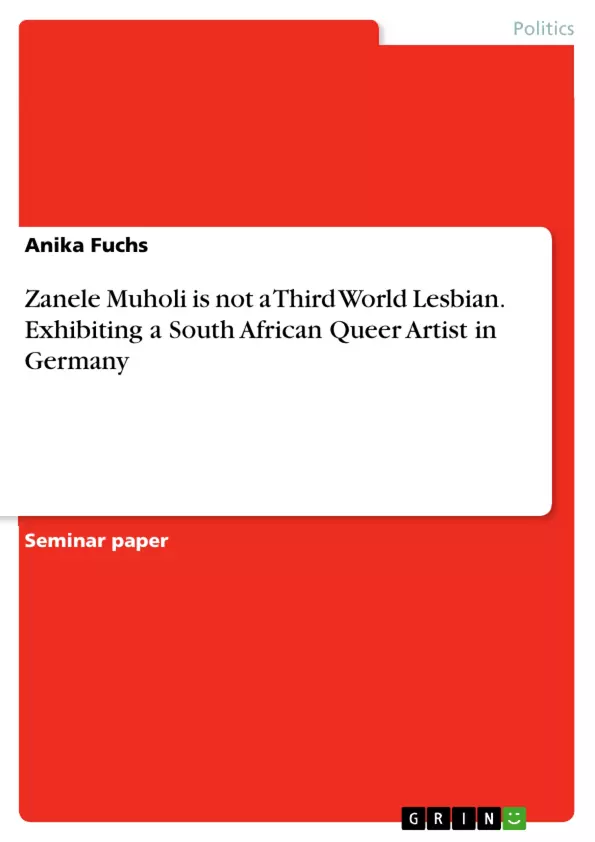This paper outlines a museum exhibition of selected photographs by the South African Queer artist Zanele Muholi. My aim for this exhibition is on the one hand to make South African Queers visible, and on the other hand to challenge mainstream Western (and racist) notions of gender in an African society. In addition to this, I want to question whether it is possible to display such photographs in a museum without reproducing the colonial gaze.
Inhaltsverzeichnis (Table of Contents)
- Invisible Queers in South Africa
- The Oriental Other
- The Third World Woman
- The Subaltern
- Constructing Third World Lesbians
- Homosexuality as “the white man's disease”
- Zanele Muholi, Visual Activist
- How to exhibit – challenges and ideas
- Conclusion
Zielsetzung und Themenschwerpunkte (Objectives and Key Themes)
The aim of this work is to challenge Western notions of gender and sexuality in an African context, specifically focusing on the experiences of Black South African queers. The project aims to make these individuals visible and to create a counter-narrative that challenges the homogenizing and often negative representations of African queers in Western media and discourse.
- The construction of the African Other in Western discourse
- The impact of colonialism on gender and sexual identities in Africa
- The visibility and self-representation of Black South African queers
- The challenges of exhibiting queer art from Africa in a Western context
- The role of visual activism in challenging hegemonic narratives
Zusammenfassung der Kapitel (Chapter Summaries)
- Invisible Queers in South Africa: This chapter introduces the topic of queer visibility in South Africa, highlighting the contradiction between legal rights and social realities. It also introduces Zanele Muholi as a key figure in documenting the lives of Black South African queers.
- The Oriental Other: This chapter explores Edward Said's concept of Orientalism and its implications for understanding representations of Africa. It argues that the construction of the Orient as inferior and backward is a necessary component of Western self-representation.
- The Third World Woman: This chapter delves into Chandra Talpade Mohanty's analysis of the construction of the "Third World Woman," arguing that this concept perpetuates colonial power dynamics by homogenizing the experiences of women from diverse cultures.
- The Subaltern: This chapter examines Gayatri Chakravorty Spivak's concept of the subaltern, exploring the challenges of giving voice to marginalized groups and the potential for Western academics to perpetuate colonial power structures.
- Constructing Third World Lesbians: This chapter uses a news article from the German newspaper Tagesspiegel as an example to demonstrate how Western discourses construct Africa as homophobic and reinforce stereotypical notions of African queerness.
- Homosexuality as “the white man's disease”: This chapter examines the history of same-sex practices in Africa and argues that homophobia is a cultural import introduced through colonialism and Western discourses about homosexuality.
- Zanele Muholi, Visual Activist: This chapter introduces the artist Zanele Muholi and her work as a visual activist, highlighting her commitment to documenting the lives and experiences of Black South African queers.
- How to exhibit – challenges and ideas: This chapter proposes a museum exhibition for Zanele Muholi's work, exploring the challenges of displaying queer art from Africa in a Western context and offering ideas for a thoughtful and inclusive exhibition design.
Schlüsselwörter (Keywords)
This work explores the intersection of race, gender, and sexuality in a postcolonial context, focusing on the experiences of Black South African queers. Key terms and concepts include: Orientalism, Third World Woman, subaltern, homophobia, visual activism, self-representation, and the colonial gaze. The work draws on the theories of Edward Said, Chandra Talpade Mohanty, Gayatri Chakravorty Spivak, and Michel Foucault to analyze the complex power dynamics at play.
Frequently Asked Questions
Who is Zanele Muholi?
Zanele Muholi is a South African visual activist and artist dedicated to documenting and making visible the lives of Black South African queers through photography.
What is the "colonial gaze" in the context of art exhibitions?
The colonial gaze refers to a way of looking at non-Western subjects that reproduces power imbalances, often stereotyping them as "exotic" or "primitive" from a Western perspective.
How does the work address the concept of the "Third World Woman"?
Drawing on Chandra Talpade Mohanty’s theories, the work critiques how Western discourse homogenizes women from diverse cultures into a single, often victimized, category.
Is homophobia considered an "import" to Africa in this study?
The paper argues that homophobia is often a cultural import introduced through colonialism and Western religious/legal discourses, countering the claim that homosexuality is a "white man's disease."
What are the challenges of exhibiting African queer art in Germany?
Key challenges include avoiding the reproduction of racist notions of gender and ensuring that the subjects are presented with agency rather than as objects of pity or curiosity.
What is visual activism?
Visual activism is the use of visual media, like photography, to challenge hegemonic narratives, claim visibility for marginalized groups, and drive social or political change.
- Quote paper
- Anika Fuchs (Author), 2015, Zanele Muholi is not a Third World Lesbian. Exhibiting a South African Queer Artist in Germany, Munich, GRIN Verlag, https://www.grin.com/document/305189



